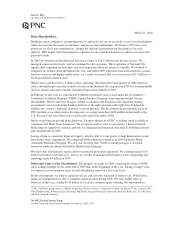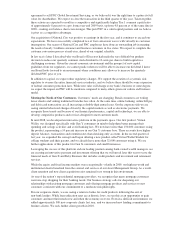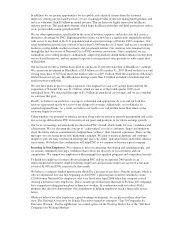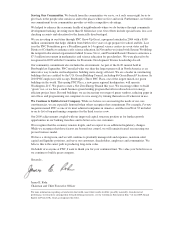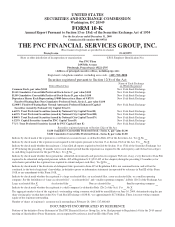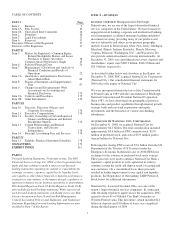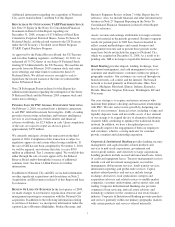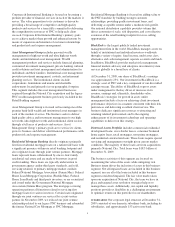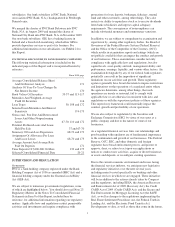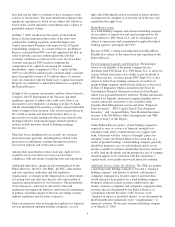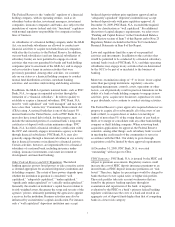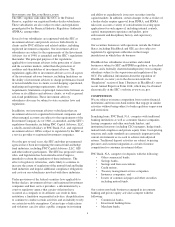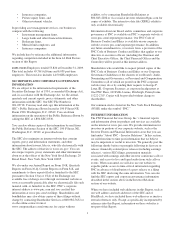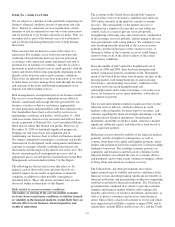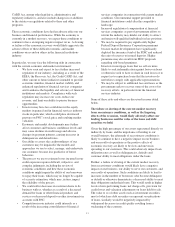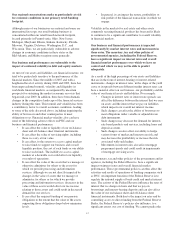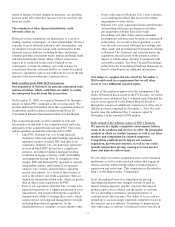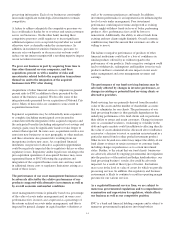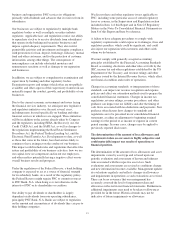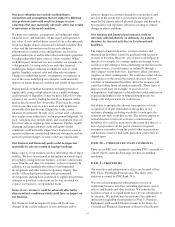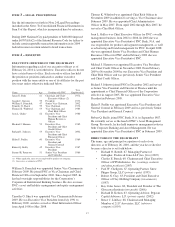PNC Bank 2009 Annual Report Download - page 11
Download and view the complete annual report
Please find page 11 of the 2009 PNC Bank annual report below. You can navigate through the pages in the report by either clicking on the pages listed below, or by using the keyword search tool below to find specific information within the annual report.
The Federal Reserve is the “umbrella” regulator of a financial
holding company, with its operating entities, such as its
subsidiary broker-dealers, investment managers, investment
companies, insurance companies and banks, also subject to the
jurisdiction of various federal and state “functional” regulators
with normal regulatory responsibility for companies in their
lines of business.
As subsidiaries of a financial holding company under the GLB
Act, our non-bank subsidiaries are allowed to conduct new
financial activities or acquire non-bank financial companies
with after-the-fact notice to the Federal Reserve. In addition,
our non-bank subsidiaries (and any financial subsidiaries of
subsidiary banks) are now permitted to engage in certain
activities that were not permitted for banks and bank holding
companies prior to enactment of the GLB Act, and to engage
on less restrictive terms in certain activities that were
previously permitted. Among other activities, we currently
rely on our status as a financial holding company to conduct
mutual fund distribution activities, merchant banking
activities, and securities underwriting and dealing activities.
In addition, the GLB Act permits national banks, such as PNC
Bank, N.A., to engage in expanded activities through the
formation of a “financial subsidiary.” In order to qualify to
establish or acquire a financial subsidiary, PNC Bank, N.A.
must be “well capitalized” and “well managed” and may not
have a less than “satisfactory” Community Reinvestment Act
(CRA) rating. A national bank that is one of the largest 50
insured banks in the United States, such as PNC Bank, N.A.,
must also have issued debt (which, for this purpose, may
include the uninsured portion of a national bank’s long-term
certificates of deposit) with certain minimum ratings. PNC
Bank, N.A. has filed a financial subsidiary certification with
the OCC and currently engages in insurance agency activities
through financial subsidiaries. PNC Bank, N.A. may also
generally engage through a financial subsidiary in any activity
that is financial in nature or incidental to a financial activity.
Certain activities, however, are impermissible for a financial
subsidiary of a national bank, including insurance under-
writing, insurance investments, real estate investment or
development, and merchant banking.
Other Federal Reserve and OCC Regulation. The federal
banking agencies possess broad powers to take corrective action
as deemed appropriate for an insured depository institution and
its holding company. The extent of these powers depends upon
whether the institution in question is considered “well
capitalized,” “adequately capitalized,” “undercapitalized,”
“significantly undercapitalized” or “critically undercapitalized.”
Generally, the smaller an institution’s capital base in relation to
its risk-weighted assets, the greater the scope and severity of the
agencies’ powers, ultimately permitting the agencies to appoint
a receiver for the institution. Business activities may also be
influenced by an institution’s capital classification. For instance,
only a “well capitalized” depository institution may accept
brokered deposits without prior regulatory approval and an
“adequately capitalized” depository institution may accept
brokered deposits only with prior regulatory approval. At
December 31, 2009, PNC Bank, N.A. exceeded the required
ratios for classification as “well capitalized.” For additional
discussion of capital adequacy requirements, we refer you to
“Funding and Capital Sources” in the Consolidated Balance
Sheet Review section of Item 7 of this Report and to Note 23
Regulatory Matters included in the Notes To Consolidated
Financial Statements in Item 8 of this Report.
Laws and regulations limit the scope of our permitted
activities and investments. In addition to the activities that
would be permitted to be conducted by a financial subsidiary,
national banks (such as PNC Bank, N.A.) and their operating
subsidiaries may engage in any activities that are determined
by the OCC to be part of or incidental to the business of
banking.
Moreover, examination ratings of “3” or lower, lower capital
ratios than peer group institutions, regulatory concerns
regarding management, controls, assets, operations or other
factors, can all potentially result in practical limitations on the
ability of a bank or bank holding company to engage in new
activities, grow, acquire new businesses, repurchase its stock
or pay dividends, or to continue to conduct existing activities.
The Federal Reserve’s prior approval is required whenever we
propose to acquire all or substantially all of the assets of any
bank or thrift, to acquire direct or indirect ownership or
control of more than 5% of the voting shares of any bank or
thrift, or to merge or consolidate with any other bank holding
company or thrift holding company. When reviewing bank
acquisition applications for approval, the Federal Reserve
considers, among other things, each subsidiary bank’s record
in meeting the credit needs of the communities it serves in
accordance with the CRA. Our ability to grow through
acquisitions could be limited by these approval requirements.
At December 31, 2009, PNC Bank, N.A. was rated
“outstanding” with respect to CRA.
FDIC Insurance. PNC Bank, N.A. is insured by the FDIC and
subject to premium assessments. Regulatory matters could
increase the cost of FDIC deposit insurance premiums to an
insured bank as FDIC deposit insurance premiums are “risk
based.” Therefore, higher fee percentages would be charged to
banks that have lower capital ratios or higher risk profiles.
These risk profiles take into account weaknesses that are
found by the primary banking regulator through its
examination and supervision of the bank. A negative
evaluation by the FDIC or a bank’s primary federal banking
regulator could increase the costs to a bank and result in an
aggregate cost of deposit funds higher than that of competing
banks in a lower risk category.
7

